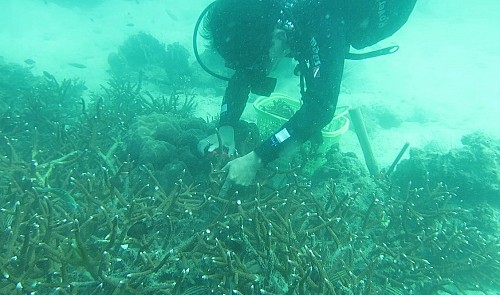Marine experts have been transplanting corals in swathes of sea surrounding southern Vietnam’s Phu Quoc, in an attempt to revitalize the island’s coral population.
On a warm December day near Mong Tay (Fingernail) Islet, a few hours by boat away from the port of An Thoi Town in Phu Quoc, a group of marine experts from Phu Quoc’s Marine Protected Areas were putting on their diving gear to prepare for their daily visit to their coral garden, which spans 40 square meters of seabed at a depth of seven meters.
Their task is to examine whether the corals, planted a few months prior, are adapting well to their new environment, and to replace any individuals that were no longer alive.
Branches of healthy corals from natural reefs are cut and replanted in the garden, where they are attached to PVC frames fixed to the seabed.
“Corals are animals by nature, and therefore are extremely sensitive to their surrounding environment,” Ngoc, the group leader said.
“A number of strict standards need to be met for corals to thrive, including unpolluted water, a substrate that is neither too deep nor too shallow, and a location away from human activities.”
At present, Phu Quoc Marine Protected Area only transplants staghorn corals, a stony coral with cylindrical branches, because of their ability to grow quickly and their importance in terms of their overall contribution to their fishery habitat.
It takes between two and three weeks to determine whether a newly planted coral branch will survive in the new environment.
Those that make it through the first few weeks are left to grow in the garden for two years before healthy corals are selected to be relocated to natural coral reefs that have been destroyed.
It can take three or more years for these ‘new residents’ to take root in the substrate and become a permanent part of the reef.
“The difficult part of coral transplantation is the fact that their growth depends almost entirely on themselves and the natural habitat, and there is little we can do to help,” Ngoc explained.
Phu Quoc is home to 500 hectares of coral reef that boast 250 different species of coral, according to survey statistics.
The island’s coral reef ecosystem has been deteriorating in recent years due to the warming of coastal seawater as well as the booming tourist industry and fishing activities.
























































